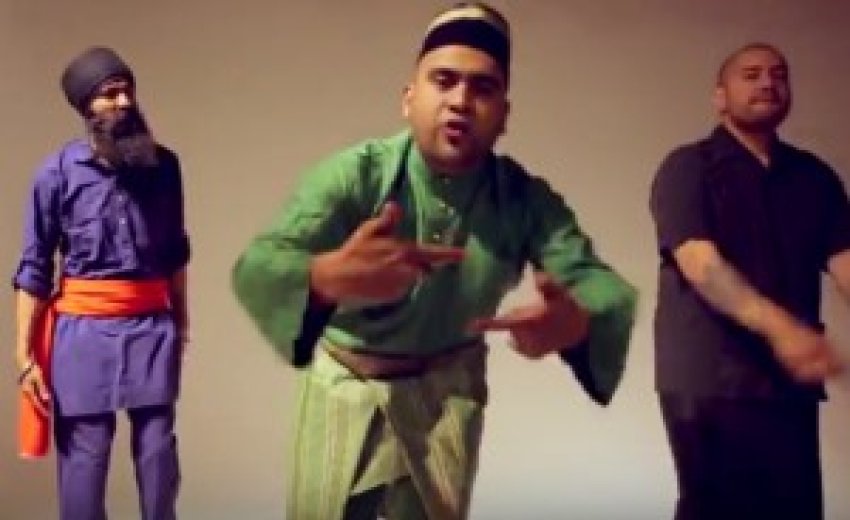Three rappers and a singer-songwriter join forces in a new track about their ancestral roots, and the experience of being ‘second-generation’ in Australia
|
|
| Watch Omar Musa, Hau, L-Fresh the Lion and Lior in the video for The Past Becomes You |
Tuesday 8 December 2015: Omar Musa, the Miles Franklin-nominated author, has a life that’s split between page and stage – not that he sees it that way. “I’m trying to break down those barriers. People ask: ‘What was it like writing a serous piece of work after just doing hip-hop?’ I take offence at that. I know how intelligent rappers are, how much thought goes into their lyrics.”
No surprise then that when Musa put out his latest music video out, he enlisted some friends to be part of it. The idea was simple: “Getting different hip-hop artists of diverse cultural backgrounds together to tells their family stories.” Australian hip-hop maintains a high quality, says Musa, but “oftentimes the stuff that gets airplay is pretty Anglo-Australian”.
 For the four-minute track, The Past Becomes You, (see Video above-ED) Musa, who is second-generation Malaysian-Australian, is joined by Hau Latukefu, the Tongan-Australian rapper and former member of the hip-hop duo Koolism, and L-Fresh the Lion (real name Sukhdeep Singh), whose track Get Mine drew on his Sikh-Punjabi heritage for an articulate attack on racism in Australia.
For the four-minute track, The Past Becomes You, (see Video above-ED) Musa, who is second-generation Malaysian-Australian, is joined by Hau Latukefu, the Tongan-Australian rapper and former member of the hip-hop duo Koolism, and L-Fresh the Lion (real name Sukhdeep Singh), whose track Get Mine drew on his Sikh-Punjabi heritage for an articulate attack on racism in Australia.
Each musician takes on a verse to tell their family story, appearing in their own clothes and in the traditional dress of their community (a baju Melayu for Musa, a tupenu for Hau and a kurta for L-Fresh), before Lior Attar, the Israeli-Australian singer-songwriter from Melbourne, comes in with a hauntingly lyrical chorus. The sparse but effective video is directed by Stackhat who has worked with Jai Courtney and Flying Lotus.
“Hip-hop is considered to be very modern but we’ve inherited this energy – the storytelling, music-making and poetry – from our ancestors and forefathers,” says Musa. “There’s this same ancient seam running through it, no matter where you’re from in the world.
“It doesn’t matter if you come from a Polynesian, African or Aboriginal background. Everyone has oral storytelling in their cultures, and I think that’s why hip-hop has become so popular.”
Reclaiming your roots isn’t always easy, he says. “I’ve had to put a whole lot of energy into it. If I didn’t make the effort to go back to Borneo, spend time with my family and read up on their history, it could very easily be lost.”
But the rewards are worth it. “My grandmother never learned to read or write but she has over 100 poems that she created in her head at the age of eight. I never even knew that. And it keeps going back and back through the generations.
“My dad was the first to spot the connection – when he heard me and my friends improvising rhymes, he said: ‘We used to do that in the village.’”
The Past Becomes You is personal stuff, not polemic, says Musa. “The stance is political – the mere action of us telling our stories in this way. But the stories are nuanced and, I hope, dignified. People can extrapolate all sorts of things. But hopefully they will relate to the specifics.”
Is Canberra listening? “I very much doubt the politicians are paying any attention to rappers and poets. But history works in weird ways,” says Musa.
“In 20 years, it could be my children – or theirs – taking it all in, soaking it up and then claiming their voices and getting into public life.”
• Omar Musa is supporting Akala on his Australian tour in Melbourne (17 December), Brisbane (18 December) and Sydney (19 December)
---------------------------------
Related Article:
http://www.sikhnet.com/news/meet-sikh-rapper-looking-change-world-through-hip-hop
